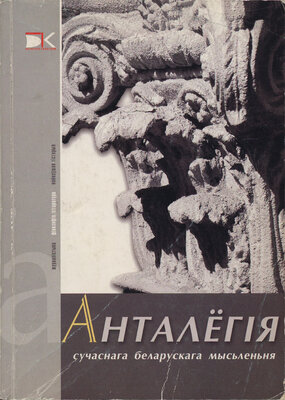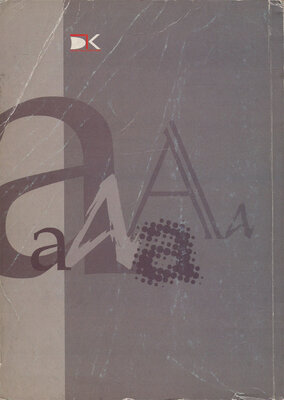Анталёгія сучаснага беларускага мысьленьня
Памер: 496с.
Пецярбург 2003
ца ўжо не пытаньне пра самагубства (паводле Камю, галоўнае для нас — вырашыць, ці вартае жыцьцё высілкаў, каб быць пражытым), а пытаньне пра саманараджэньне. у якім выглядзе й колькі разоў варта вяртацца сюды. Дызайнэрскае праектаваньне ўласнага цела дазволіць кожнаму стацца амаль такім жа шматаблічным, якім пакуль можа быць хіба што Бог, якога мы бачым штодня ў выглядзе зорнага неба, палальнага хмызьняку, тэлевізара альбо нейкай іншай істоты ці рэчы.
Далей нас чакае зьяўленьне дзіўных істот-“кактэйляў” з часьцінак і думак людзей і разумных прадметаў. Праблема пазашлюбных сувязяў павінна зьнікнуць, бо мужу ці жонцы можна будзе надаць якое заўгодна аблічча. Страцяць сэнс і крадзёж, і падман, і забойства. Чалавек зь мільёнам лёсаў будзе такі ж нэўтральна-бязгрэшны, як само чалавецтва. Кібэрі біятэхналёгіі дазволяць ператварыць усялякую думку ў праўду — прынамсі, ажыцьцявіць усе мэтафары й гіпэрбалы, назапашаныя паэтамі й журналістамі. Мастакі змогуць, нарэшце, фізычна растварыцца ў сваіх творах і размаўляць адтуль з гледачамі, а акторы — ператварыцца на малекулярным узроўні ў сваіх герояў і рэальна ўзнаўляць падзеі ўсясьветнае гісторыі, фантазіі драматургаў і ўласныя сны. Мы паспрабуем па чарзе ўвасобіць у яву ўсе мастацкія творы й усе развагі філёзафаў мінулых эпох. I наадварот, усялякую драбнюткую рэч ці жывую істоту мы зробім галоўнай дзейнай асобай адпаведнага мастацкага твору.
Прыкладна адначасна з гарантаваньнем кожнай разумнай істоце права на несьмяротнасьць (а можа, і раней) зьявяцца тэхналёгіі татальнай утылізацыі адкідаў, перапрацоўкі абсалютна ўсяго сьмецьця ў новыя тавары. Экалягічна дасканалы сьвет бязь сьмецьця будзе ў той самы час і сьветам бязь сьмерці, дзе нават рэчы не паміраюць назаўжды.
Напэўна, звычайных людзей будзе нараджацца ўсё менш і мснш, але чалавецтва ўсё адно будзе пашырацца за кошт чалавекападобных мэханізмаў і арганізмаў. Вынікам бясконцага
вынаходніцтва новых рэчываў, біялягічных відаў і словазлучэньняў павінна стацца ператварэньне паўсюднага “няма” ў “можа быць”, недасканалай рэчаіснасьці — у сьвет роўных магчымасьцяў, дзе кожны мае па чарзе стаць усімі іншымі жывымі ці амаль жывымі істотамі. Зразумела, і сабою ў тым ліку: у бязьмежным шэрагу “мы” знойдзецца месца ўсялякаму “я”.
1997 г.
ANTHOLOGY OF CONTEMPORARY BELARUSIAN THINKING
This book has emerged in its own specific context, which could be traced back to the late 1980s and early 1990s when the former Soviet Union faced a rise of national movements, followed by the formation of new independent states. All of a sudden Belarus turned into a beautiful cultural myth exposed to general public. That myth was viewed in different ways, quite often negatively. However, it can be ascertained that the myth challenged a number of young Belarusian scholars and intellectuals to produce new feelings never experienced before. Mysterious as it was, the myth revealed the country’s former cultural, political and historical grandeur.
However, later on it became evident that the myth did not go well with the Belarusian reality of the time, i.e. with the actual state of things in the country, its cultural and intellectual scene as well as the mind of the Belarusian population. Soviet literatury and art discourse used to present Belarus as a country without its own history or high culture, which we were forced to attribute to other nations, rather than to ourselves.
The official version of Belarusian history produced nothing but an inferiority complex portraying the country as a perennial cultural and intellectual province. Numerous chairs and departments of
Marxism, history of the CPSU and other ideological “sciences” were aimed at sustaining this image. Therefore, Belarus as a cultural and non-ideological reality was conspicuously absent in the texts they produced. That absence was the first and extremely important challenge. To meet it meant positioning the country and its culture in different historical, cultural and research contexts. Besides, it had also to be put in a different perspective, beyond the limits of Soviet Marxist discourse. Thus, what we call contemporary Belarusian thinking emerged from denying Soviet philosophy, communist ideology and censorship. Ideology and Marxism died quietly in the minds of some Belarusian intellectuals to give rise to a new Belarusian discourse.
The second challenge was much more important: what is thinking and what does it mean? The reply to this question was apathetical and radical. Thinking does not mean interpreting texts produced by others. Others’ texts can easily become crutches for thievish and lazy minds. Thinking cannot be grasped in any formulae, especially in ideological ones. Thinking does not subjugate nor can it be subjugated. It destroys dependences and creates a space of individual freedom. Acts and events of thinking are challenges and adventures in themselves. In fact, adventurousness is never a guarantee of success. However, it creates a new experience that can make a foundation for achieving success in new attempts of thinking.
And finally, the third challenge was the Belarusian language, which had never been the language of modern philosophical thinking before. The language was to be understood as a matrix of thinking rather than its means or instrument. Thinking had to be implemented not via the language, but within its framework. In other words, the Belarusian language made an important element in the development of this unique discourse. When revealed in other languages, it tends to lose a number of overtones and essential connotations; similarly a translation loses in comparison with the original.
Generally speaking, this is the set of ideas that determined the frame of mind among some young Belarusian intellectuals in the late 1980s and the early 1990s.
Some words should be said about the texts constituting the book. Firstly, these are intellectual texts written in Belarus and abroad during the last ten years. In terms of the context described above these texts cannot be defined as strictly scholarly. Mostly, they are written in the genre of a philosophical, literary and art critical essay. This genre is used here as a free and the least formal way of writing.
The authors belong to different intellectual groups and the texts were created at different times. Among the authors are very young people who represent the new generation of Belarusian intellectuals. This really wide representation gives an insight into the Belarusian intellectualism of the latest decade.
The book has been prepared by the Belarusian Collegium and it should be mentioned that the majority of the authors are professors at the BC.
Finally, I would like to express my gratitude to the Polish Institute in Minsk and the Royal Embassy of the Netherlands in Warsaw for their support in the preparation of this book.
Ales Ancipienka,
Minsk, Belarus
May, 2003
ВЫДАНЬНІ БК:
кнігі, часапісы,
газэта...
Ц I S Т о R I с А
АНТАЛЁПЯ СУЧАСНАГА
БЕЛАРУСКАГА МЫСЬЛЕНЬНЯ
Падпісана ў друк 12.06.2003 г.
Фармат 84x108'/,,. Папера афсетная.
Друк. а. 17,50. Наклад 600 асоб. Замова № 46
ООО “Невскнй Простор”.
194100, г. Санкт-Петербург, пр-т М. Тореза, 6.
Лнцензня І4Д № 05720 от 30.08.2001 г.
Надрукавана ў друкарні “Т-Сервнс”, г. Масква
ISBN 5-94716-021-8
 КНІГІ ОНЛАЙН
КНІГІ ОНЛАЙН


